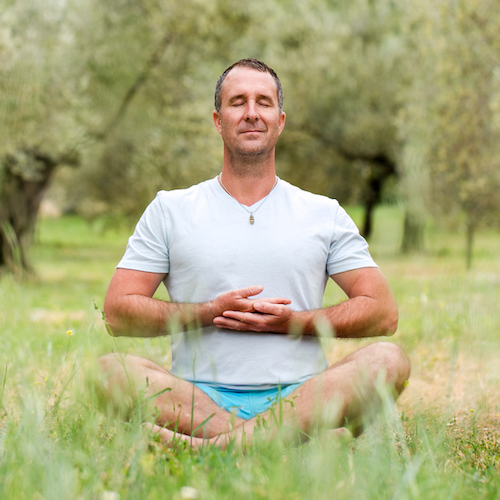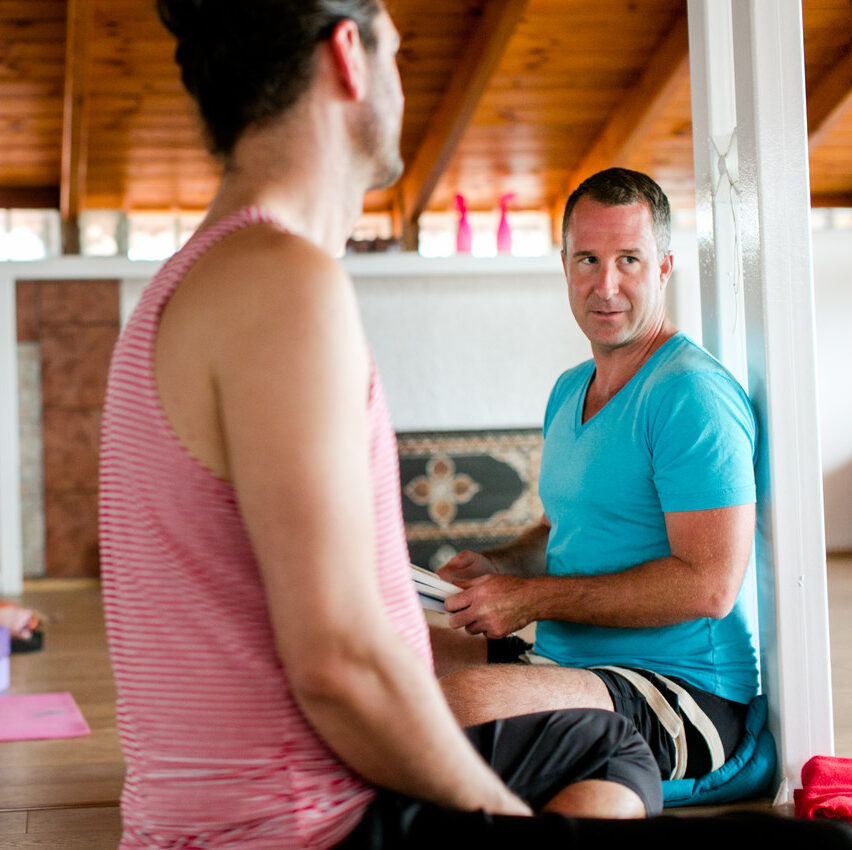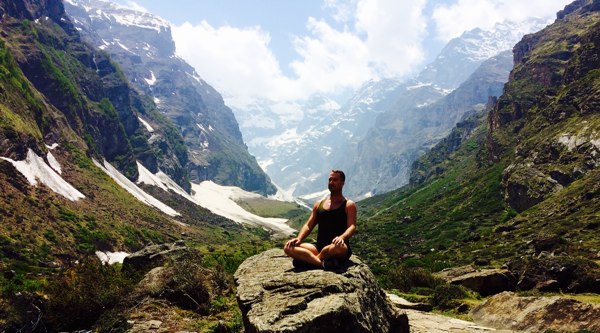An easy guided meditation for any time you’re struggling with insomnia or need to relieve feelings of anxiety and stress.
Do you sometimes toss and turn at night, unable to quiet your racing thoughts even when you’re bone-tired?
Do you experience nagging feelings of stress and anxiety even when you’re doing the things you love, like planning an upcoming trip, meeting a friend for a latte, or sitting on the sofa with a novel on a Saturday afternoon?
When you do try to relax, do you find yourself picking up your phone and mindlessly scrolling social media every few minutes?
If these scenarios sound familiar, I want you to know you’re not alone.
According to ADAA, some 6.8 million Americans experience anxiety, with common symptoms including restlessness, fatigue, brain fog, insomnia, and irritability.
But I also want you to realize that it is possible to overcome anxiety so that you can quiet your mind and feel at peace within.

How? Meditation.
Now… I know some of you think you can’t meditate.
You imagine sitting cross-legged in silence for thirty minutes trying to calm your overactive brain — and you can come up with approximately eleventy thousand other things you’d rather do instead.
Here’s the thing:
Even if your thoughts run through your brain like a hamster on a wheel, meditation can work for you. New research reveals that practicing mindfulness exercises for anxiety can be as helpful as taking a daily pill!
Ready to give meditation for anxiety a try? Excellent. Let’s dive in.
Understanding meditation for insomnia and anxiety
“The truth is that there is no actual stress or anxiety in the world; it’s your thoughts that create these false beliefs. You can’t package stress, touch it, or see it. There are only people engaged in stressful thinking.” – Wayne Dyer.
Picture this:
You’re sitting on a plane, ready to take off on a much-needed vacation. Suddenly, thoughts of plane crashes and turbulence flood your mind. You begin to feel anxious. Your heart rate increases, and your palms sweat.
You glance down and notice you’ve inadvertently clamped your moist hand around the wrist of the middle-aged guy sitting next to you, a stranger who just wants to enjoy his $18 diet Coke and mini pretzel bag.

As you sit there, trying to remember the statistical safety of air travel, your mind continues to conjure up worst-case scenarios.
The thing is, despite your logical knowledge, your irrational fears persist, creating a vortex of anxiety that threatens to consume you.
This is the power of your thoughts — and it is precisely why guided meditations are such a potent tool for conquering anxiety.
Our thoughts are not eternal truths. They come, and they go, like the ocean’s changing tides..
With the help of guided meditation, we can develop the ability to master our thoughts and overcome our fears. We can reframe our perspective and shift our focus towards the present moment rather than feel consumed by worries about the future. When we learn to control our thoughts and let go of our anxieties, we can truly enjoy life’s journey, literally and metaphorically.
There’s science behind meditation for insomnia and anxiety, too.
Here’s the gist: Meditation triggers the body’s natural relaxation response by lowering heart rate, blood pressure, and muscle tension, while increasing oxygen flow and reducing the production of stress hormones.
A guided meditation for insomnia and anxiety
This guided meditation will help you ease anxiety and insomnia, so you can relax and connect with your inner peace. Through this meditation, you’ll learn how to tap into your inner light and use it to heal and transform your mind and body. So take a deep breath, and let’s begin.
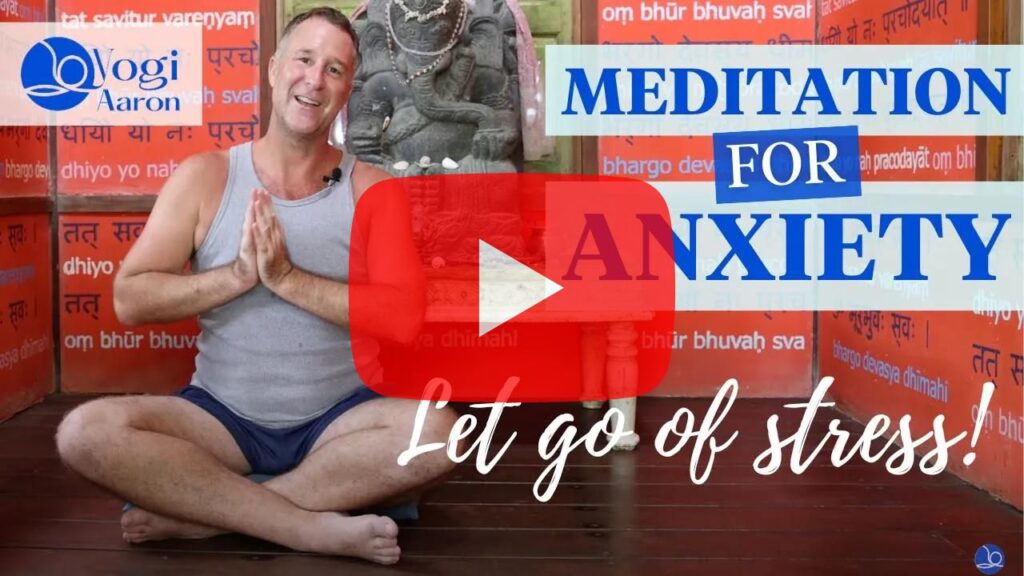
I highly recommend joining me in the guided meditation for insomnia and anxiety video I’ve provided above. That said, I’ve also provided a summary of the anxiety meditation below for your convenience.
Begin by finding a comfortable seat with a straight spine. You don’t need to sit in a complicated or “fancy” yoga posture; find a seat where you can sit upright easily for about twenty minutes. If you struggle with this, we have meditations to help strengthen your back muscles.
If you like, you can light a candle to help visualize the innate light within you.
Take a few minutes to gaze softly at the flame, then close your eyes and imagine a candle flickering within your third eye center.
Imagine this flame represents the teachers and guides who have helped you along your path. Now visualize the flame as your highest self: the compassionate mother, the protective father, the creative spirit within you.
As we continue this guided meditation for insomnia and anxiety, I want you to imagine that you are bringing the flame to your heart center.
Visualize yourself entering a cave within your heart. You follow the chamber deeper within your heart until you come across a serene pond where a brilliant white lotus flower sits. Within that lotus flower, there is another flame. Now, sit at the pond’s edge and focus on this flame within the lotus.
As you observe the lotus flower, you notice it has eight petals, each with its own flame representing different parts of your existence: earth, water, fire, air, space, your soul, the moon, and the sun. Focus on the eight flames — invite each to illuminate, nourish, and heal the element within you that it represents.

You now notice that the eight flames have merged with the central light burning within the lotus. Meditate on this main flame; ask yourself to become one with it. Imagine yourself becoming that warm, glowing light. Notice what sensations you feel. Perhaps you feel calm, peaceful, clear, or creative.
Stay with these feelings for as long as you like. When you’re ready, gently open your eyes and return to the world feeling a sense of wholeness and oneness, ready to manifest and live your life’s purpose.
Five benefits of guided meditations for insomnia and anxiety
I sincerely hope you found stress relief from this guided meditation. Now, I want to be clear…
If you want to realize the benefits of guided meditation for insomnia and anxiety, you must consistently show up. Meditation is a practice, not a one-and-done cure. But it’s work that’s worth it.
Let’s take a deeper look at the science-backed benefits of guided meditation for sleep and anxiety:
Reduces Stress Hormones
When we experience stress, our body releases hormones such as cortisol and adrenaline, disrupting our sleep and contributing to anxiety. Studies show that guided meditation can reduce the production of these stress hormones, leading to decreased anxiety and improved sleep quality.
Improves Brain Function
Guided meditations improve brain function by increasing activity in the prefrontal cortex, a part of the brain responsible for executive function and emotional regulation. In other words, meditation can improve memory, learning, attention and self-awareness.
Promotes Relaxation
Guided meditations can promote a state of relaxation, which helps you fall asleep faster and experience deeper, more restful sleep. Even better? Relaxation has been shown to counteract the physiological responses associated with anxiety.
Enhances Mindfulness
Guided meditation for insomnia and anxiety helps you become more mindful — more present in the moment and aware of your thoughts and emotions (without any judgment.) This can help you better manage your anxiety as you learn to observe and acknowledge your thoughts without becoming overwhelmed by them
Reduces Symptoms of Anxiety
Guided meditation is an effective tool in reducing symptoms of anxiety, such as panic attacks, generalized anxiety disorder, and social anxiety disorder. A meta-analysis of 47 studies found that mindfulness-based interventions, including guided meditation, effectively reduced anxiety symptoms.
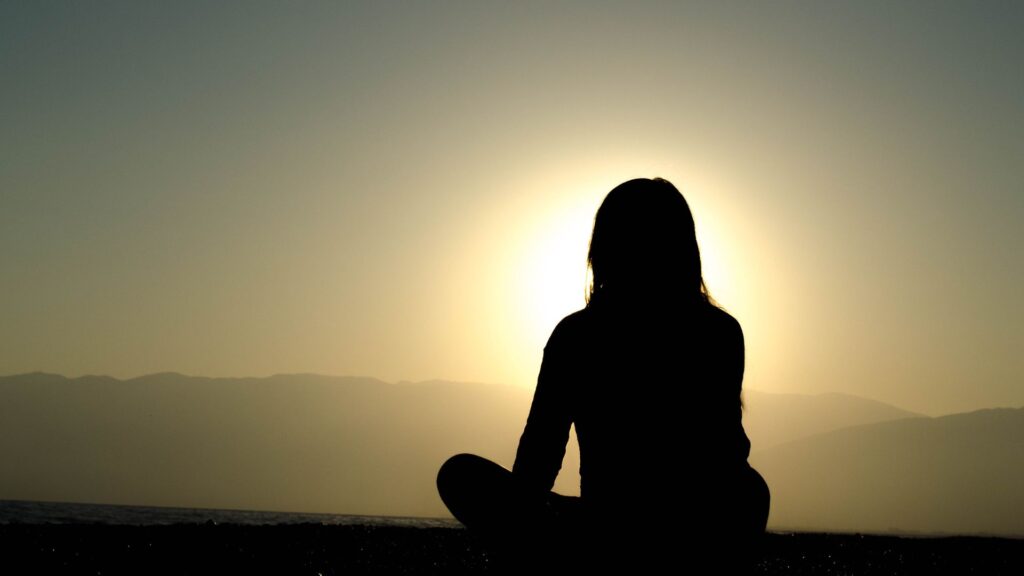
Common questions about guided meditation for anxiety
How long does it take to get results with meditation for sleep and anxiety?
There is no definitive answer to how long it takes for a guided meditation to get rid of anxiety, as it can vary depending on the individual and the severity of their anxiety.
However, as we explored above, regular guided meditation has been proven to effectively reduce anxiety symptoms over time. Some people may experience immediate relief from anxiety, while others might need several weeks or months of consistent meditation practice to see significant improvements.
Note: Please consult with your healthcare professional before starting any new treatment or practice. Get support if your anxiety is so severe that it leads to physical symptoms or panic attacks.
What is the best time of day to meditate for anxiety?
I love to meditate first thing in the morning. I find it helps to set a positive tone for the rest of the day. Our yoga teacher training graduates say morning meditation for anxiety (or for anything!) is life-changing, too.
However, others prefer to meditate in the evening to relieve stress or tension from the day — that’s fantastic, too! Ultimately, it’s up to you to experiment and find what works best for you.
What matters is that you establish a consistent meditation practice and make it a routine.

How do I help a loved one experience the benefits of guided meditation for insomnia and anxiety?
If you know someone struggling with stress and anxiety, it’s natural to want to help them. Ultimately, though, your loved ones must be the ones to make the decision to meditate. Without pressuring or prodding, here are a few ways you can support others:
- Share the benefits of meditation for anxiety, like better sleep, improved mood, and increased overall well-being
- Offer to meditate together! Let your loved ones know that you will be doing the best guided meditation for anxiety with them, so they won’t have to do it alone.
- Share your personal experience and how you’ve used meditation to manage stress and anxiety and improve your overall well-being.
- Recommend a trusted resource — or just send people to this article!
- Be patient and supportive; don’t try to “fix” anyone.
There’s a reason why meditation has been practiced for centuries: it can transform our lives by calming our minds, reducing stress, and allowing us to tap into our inner wisdom.
When we can release stress and anxiety, we open ourselves up to new possibilities — opportunities that might have otherwise seemed impossible. It’s like removing a weight holding us down, allowing us to move forward with lightness, clarity, and purpose.
I want you to remember this:
You deserve to live a purposeful, joy-filled life.
While we all suffer from stress and anxiety occasionally, these fears do not need to define you. It is possible to quiet your mind — and it would be my honor to support you.
For over 30 years, I’ve helped people from around the world eliminate physical and mental pain, so they can truly step into their greatest potential and live their life purpose. I’d love to help you, too.

